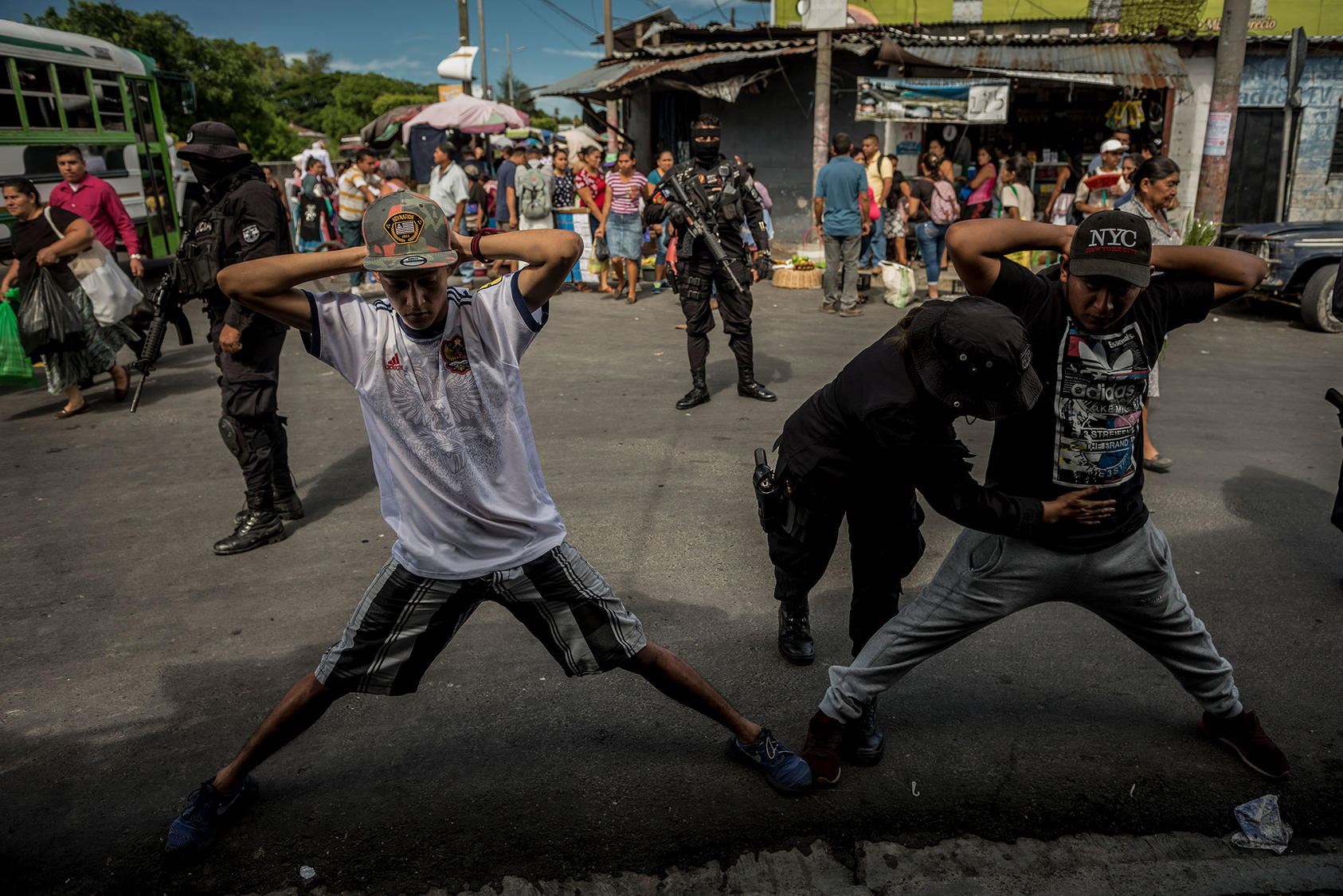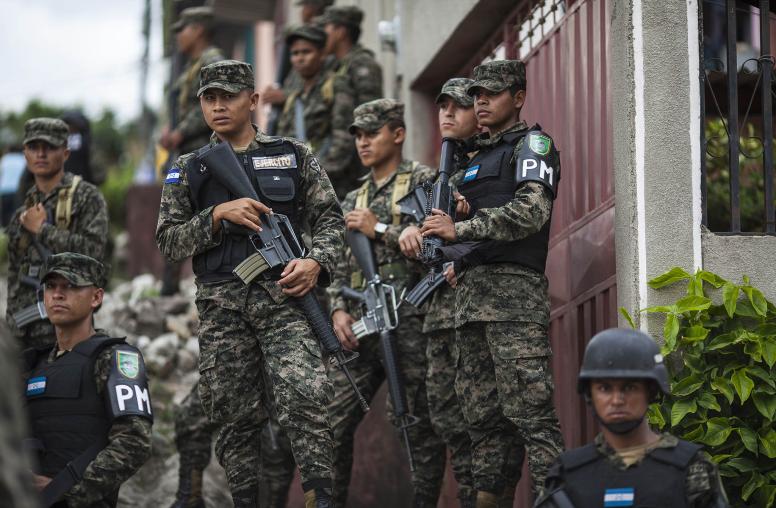El Salvador Needs Long-Term Solutions to End Cycles of Violence
Can the country deal with gang violence while still respecting human rights?
The government of El Salvador reacted harshly to a recent spike in homicides by imposing a state of emergency and rounding up thousands of suspected gang members. Recent history suggests that law enforcement alone cannot solve the problem without comprehensive gang prevention, intervention and rehabilitation programs in marginalized communities. USIP’s Mary Speck discusses violence in El Salvador and how the country can reduce crime while still respecting human rights.

Criminal violence has declined significantly in the countries of Northern Central America, especially in El Salvador. Why did killings surge at the end of March?
In 2015, El Salvador registered more than 6,650 homicides, compared to 15,696 in the entire United States that year — an average of 18 murders per day in a country whose population (about 6.5 million) is less than New York City’s. Criminal violence was killing Salvadorans in annual numbers comparable to those suffered during the country’s civil war, which claimed some 75,000 lives from 1980 to 1992.
But El Salvador’s homicide rate has been falling steadily since then. From Latin America’s most violent country (as measured in murders per 100,000 people), it slipped to number 11 in 2021. Though still dangerously violent, El Salvador’s murder rate of 18 per 100,000 had dipped well below the levels in neighboring Honduras (39 per 100,000) and Mexico (26 per 100,000).
That seemed to change over the last weekend in March when El Salvador suffered a two-day spike of more than 70 killings. And then the violence stopped almost as suddenly as it had started. Police reported only two homicides during the following weekend.
What’s behind this surge in violence followed by relative calm? Analysts say the gangs may use violence to pressure the Salvadoran government, which has implemented repressive anti-gang policies in public while negotiating with imprisoned gang leaders in private. The surge could also reflect unhappiness within the gangs over the terms of a “truce” negotiated by their leaders.
Complicating matters, the U.S. imposed sanctions on two senior Salvadoran officials in December 2021, accusing them of secretly negotiating with imprisoned leaders of Mara Salvatrucha 13 (MS-13), designated by the United States as a transnational criminal organization. The two officials — one directs the country’s prison system and the other manages a social welfare agency — allegedly provided “financial incentives” to gang leaders to keep homicides down.
The recent spike in killings lacked the hallmarks of inter-gang turf battles or score settling. El Faro, an independent investigative news outlet, says that police reports on the 46 victims identified so far show their average age was 39, older than most gang members, and that only 13 appear to have links to gang activity.
The Salvadoran government swiftly issued a state of emergency and increased penalties for suspected gang leaders. What do these measures entail? How have Salvadorans reacted to the crackdown?
President Bukele’s 30-day state of emergency suspends certain civil liberties, such as freedom of assembly, the right to a public defender and the inviolability of private communications. And it extends administrative detention beyond 72 hours. The governing party-controlled assembly also passed tougher jail sentences: gang members will face terms ranging from 20 to 45 years. Children under 16 years old could face sentences of up to 20 years and those under 12 up to 10 years. Nine days into the emergency, President Bukele said that security forces had made more than 6,000 arrests.
In addition, Bukele decreed an emergency in the country’s overcrowded jails, imposing a lockdown, seizing inmates’ bedding and cutting food rations. Posting a video of inmates stripped to their underwear in darkened cells, Bukele issued a warning to parents via Twitter: “Show this video to your teenage children, explain to them that joining a gang leads to only two outcomes: prison or death.”
An avid social-media user, Bukele appears to relish the outcry from human rights defenders, both within El Salvador and abroad. He taunts his critics on Twitter, dismissing them “as partners of the pandilleros” (gang members). The U.S. government is a favorite target: Furious over sanctions against Salvadoran officials, Bukele accused the Biden administration of seeking his country’s “submission” and of using foreign assistance to support “communists.”
Allegations that Bukele negotiated with gang leaders have not dented the president’s popularity. Nor have his efforts to take control of the judiciary, such as firing judges to empanel a new constitutional court that promptly issued a ruling allowing him to run for re-election. Salvadorans even appear willing to overlook his government’s controversial Bitcoin Law, which forces businesses to accept the cryptocurrency as legal tender.
What is President Bukele’s long-term security strategy? And what should the United States do to help El Salvador prevent gang violence while protecting human rights?
Unhappiness with the two-party system that emerged from the 1992 peace agreement propelled Bukele, a former mayor of San Salvador, to the presidency in 2019. He ran as an outsider unbeholden to supposedly corrupt elites from both the right and the left.
Though the president claims credit for the country’s declining homicide rates, the downturn began several years before he took office. Bukele’s security plan — like that of President Salvador Sánchez Cerén, his predecessor — deploys police to certain priority municipalities, concentrating on hot spots of criminal activity. Under both governments, joint soldier-police operations have periodically carried out mass arrests. And under both governments, security forces have faced accusations of abuse, including extrajudicial executions.
Also like his predecessor, Bukele has reportedly negotiated with incarcerated gang leaders, offering them incentives — such as better prison conditions — in return for ordering their members to avoid violent confrontations (though the high number of disappearances suggests that gang leaders still find ways to eliminate their rivals). These secret truces have allowed the gangs to continue dominating so-called “red zones” while extracting income through extortion and other rackets.
But gangs are not reliable partners. They seem to have periodically broken these covert agreements with homicide spikes in November 2021 and in April 2020.
El Salvador cannot resolve its gang problem through secret truces or crackdowns. But the government can do more to prevent youngsters from joining gangs and to provide an off-ramp for those already inside. A study by Florida International University found that the average gang member joined at 15 years old. Most came from households earning less than $250 a month; many reported running away from dysfunctional or disintegrated homes. Researcher José Miguel Cruz says that many want out of the gangs by age 18, but face threats from other gang members, harassment by security forces and discrimination from the wider society.
Bukele himself seems to understand that mano dura (iron fist) policies alone will not bring security to his country. Both as mayor and president, he has embraced preventive efforts to help at-risk youth in marginalized neighborhoods. His signature initiatives, known as “Cubos,” are modern, glass-walled centers offering vocational and recreational opportunities for young people in gang-dominated communities.
There are precedents for breaking the hold of criminal organizations through the joint efforts of public officials, business leaders, religious authorities and civic activists. Palermo, Italy famously wrested power from mafia bosses through a combination of tough law enforcement, urban renewal and social mobilization. Medellín, Colombia – the world’s murder capital in the early 1990s — used public-private partnerships to improve schools, libraries and parks. And Los Angeles, California has reduced urban conflict through community engagement, violence prevention and anti-gang interventions.
The United States can help El Salvador replicate these initiatives, which strengthen law enforcement while building a wider culture of lawfulness, without condoning either the government’s covert truce or its strong-arm tactics. These could include programs for youth peacebuilders, justice and security community dialogues, and promoting citizen support for the rule of law. Both governments have a keen interest in stopping the cycles of gang violence and repression that are sapping economic growth and driving Salvadoran youth to seek a better future outside the country.


